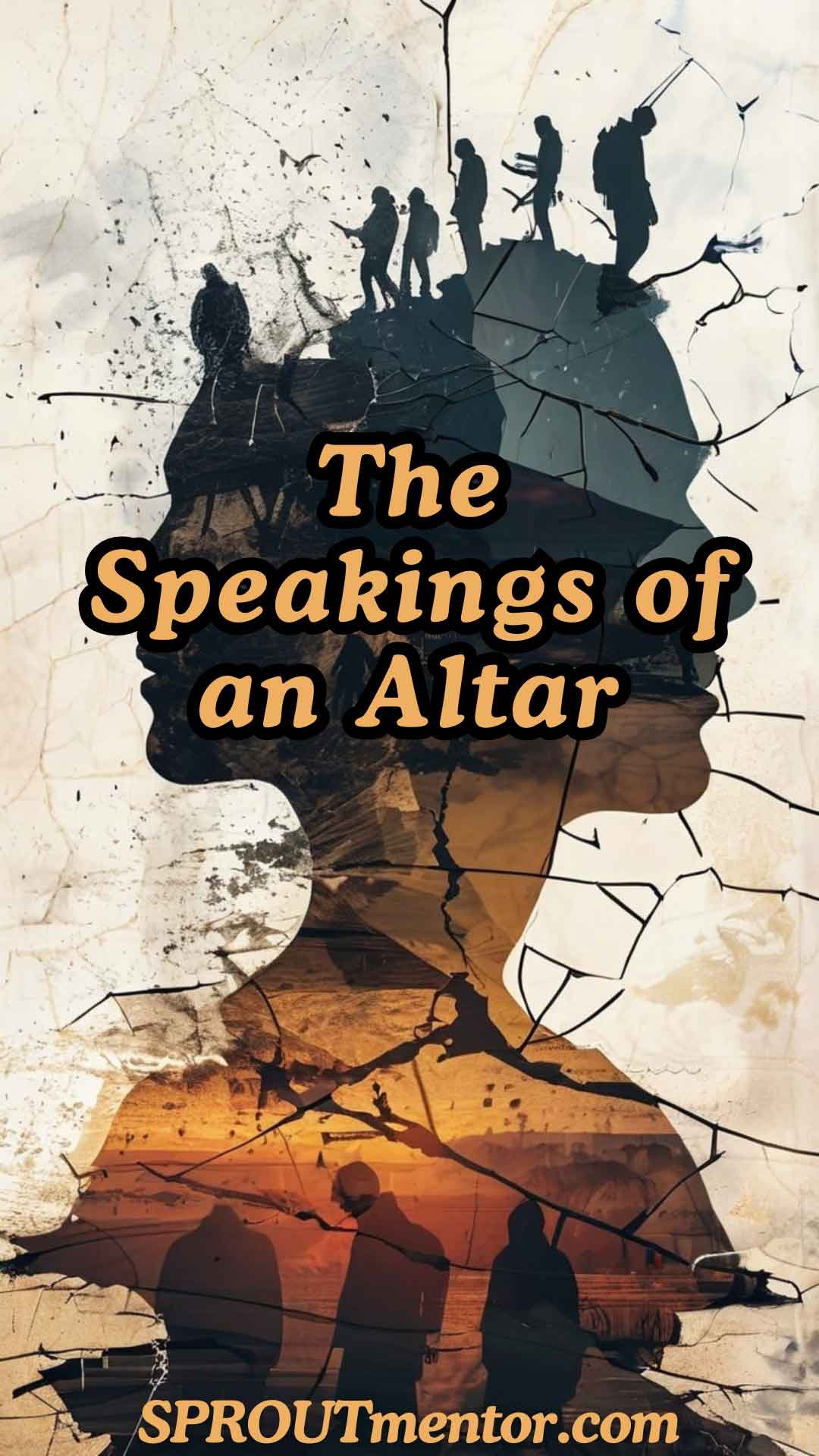The Sacrifice on the Altar

From this previous lesson, we established that:
- In the Old Testament, the nature of sacrifices required by God was explicitly outlined in the Mosaic Law:
- For every transgression, there was a corresponding offering—a sin, a trespass, or a guilt offering—each with its specific requirements.
- For instance, committing a certain sin might have required the sacrifice of ten pigeons or a lamb without blemish.
- These acts were more than just rituals; they were tangible expressions of repentance and means of atonement, temporarily covering the individual’s sin and restoring their relationship with God.
- However, as we transition into the New Testament, the paradigm shifts:
- The sacrifice of Jesus Christ on the cross fulfilled the requirements of the Old Testament Law, making way for a new kind of offering.
- The New Testament believer is called to offer something different, something more profound—spiritual sacrifices
1 Peter 2:5 — “You also, as living stones, are being built up a spiritual house, a holy priesthood, to offer up spiritual sacrifices acceptable to God through Jesus Christ”.
- These are not physical offerings of animals or grains, but offerings of the heart, mind, and soul, given by believers through Jesus Christ, our High Priest [Hebrews 4:14-16].
This raises the questions:
- What does it mean to offer spiritual sacrifices acceptable to God through Jesus Christ?
- How do we, as New Testament believers live out this concept in our daily walk with God?
In this blog post, we shall explore the 4 characteristics that a spiritual sacrifice must be or have:
#1 – Living
Unlike the dead animals offered on Old Testament altars, we bring living sacrifices on the New Testament altar.
Romans 12:1 — “I beseech you therefore, brethren, by the mercies of God, that ye present your bodies a living sacrifice, holy, acceptable unto God, which is your reasonable service.”
- This shift signifies a move from ritualistic offerings to a lifestyle of continuous dedication and worship to God.
- Unlike the one-time sacrifices of animals in the Old Testament, being a living sacrifice means continually giving ourselves in obedience, worship, and service to God.
- This is not a mere ritual but a daily commitment to live in a way that honors God.
- In other words, our lives are to be ongoing, living offerings, continually given to God in obedience and worship.
- This involves offering something from our inner being—our prayers, our praises, our acts of service, and our lives.

#2 – Inward
Our spiritual sacrifices involve more than just outward actions; they stem from our inner being.
Inward offerings are pleasing to God because they come from a heart aligned with His will, motivated by love and gratitude rather than obligation.
There are several forms of inner offerings that we offer to God such as:
- Praise and worship [Hebrews 13:15]: They are expressions of our gratitude and reverence for who God is and what He has done.
- A Contrite Heart [Psalm 51:17]: This is about brokenness, surrendering our pride, acknowledging our need for God’s mercy, and turning away from sin.
- Generosity Hebrews 13:16: Good works are not a means of earning salvation but are the fruit of a transformed life. They are the natural outflow of a heart that has been touched by God’s grace.
- Prayer [Revelation 5:8]: Prayer is not just a means of asking God for what we need; it is an act of worship and a way of aligning our hearts with God’s will.
- Obedience [1 Samuel 15:22]: Obedience means letting go of control and trusting God with every aspect of our lives. It is a daily act of faith, a decision to follow Christ, no matter the cost.
- Devotion [Matthew 6:24]: We cannot serve both God and the world; our loyalty must be undivided for no one can serve two masters without hating one of them.
- Consecration [1 Peter 2:9]: A life set apart for God, marked by holiness and dedicated service, leaving no room for sin or disobedience.
- Holiness [1 Thessalonians 4:3-4]: Living in a way that reflects God’s purity and righteousness by controlling our bodies and minds, resisting sin, and living in a manner that is honorable before God.
#3 – Reasonable
In Romans 12:1b, the phrase “reasonable service” or “true and proper worship” implies that offering ourselves as living sacrifices is the least, we can do in response to God’s mercy.
- It’s the only logical and fitting response to the grace and salvation we have received through Jesus Christ.
- This reasonable sacrifice is not about going above and beyond; it’s about giving God what He rightfully deserves—our whole lives.
- These are reasonable sacrifices that God deems acceptable because they stem from a heart aligned with His will.
#4 – Divinely-Guided
The key to understanding spiritual sacrifices lies in recognizing that they are not guided by human wisdom but by spiritual knowledge.
- In the Old Testament, the type and manner of sacrifices were explicitly outlined in the law written on scrolls and tablets of stone among other physical mediums.
- In the New Testament, the law is written in our minds and hearts [Hebrews 8:10] by the God in Us – The Holy Ghost.
- Therefore, New Testament believers are called to offer sacrifices that are spiritually discerned by being attuned to the Holy Spirit’s guidance.
- In other words, spiritual sacrifices are offerings made in response to divine insight, directed by the Holy Spirit.
- That means the New Testament priesthood is not something we can undertake ignorantly.
- It requires a deep understanding and knowledge that comes from our helper and teacher The Holy Spirit of Truth [John 14:17-19].
Jesus’ sacrifice on the cross was the ultimate example of a perfect offering, as it was made in complete obedience to the will of God, guided by the Holy Spirit.
- Hebrews 9:13-14 emphasizes that Christ offered Himself “through the eternal Spirit,” making His sacrifice not only sufficient but perfect.
- This act of obedience and spiritual knowledge fulfilled the requirements of justice and opened the way for humanity’s redemption.
- This example of Jesus illustrates that the power and effectiveness of a sacrifice are directly tied to the spiritual knowledge and obedience of the one offering it.
- This means continually building fellowship and intimacy with the Holy Spirit to make sure that we have access to divine guidance so that we offer spiritual sacrifices that are pleasing to God and aligned with His will.

In conclusion …
What are you placing on the altar today?
Is it just fragments of devotion, or are you laying down your entire being—your thoughts, your desires, your plans?
God no longer seeks the sacrifice of animals but the sacrifice of a life fully surrendered.
This surrender is not just an act but a journey—one that requires daily commitment, a continual yielding to the Holy Spirit’s guidance.
It’s a call to deeper intimacy with God, where every choice, every action, every thought becomes an offering.
The time for halfway devotion is over; it’s time to offer yourself fully to the One who offered Himself fully for you.
Let your life be the altar where God’s presence dwells, where every moment is an act of worship, and every breath is a sacrifice of praise.
Are you feeling stuck in your Christian walk?
We offer a powerful collection of Christian ebooks designed to equip you for growth and empower you to live a life guided by your faith.
Share This Blog Post On:
Are you looking for a deeper understanding of your faith? I’m excited to let you know that I have written books that delve into scripture and offer insights to help you grow in your Christian walk. Learn more about my books by visiting this link.







